民主和平论
国外“民主和平论”研究:批评与回应——基奇结构性解释的视角

据 相 抵牾 等 问题 。结 构 性 解释 论 者 据 此 对 已有 解 释进 行 了修 正 和 完 善 , 但并 没有 令 人 信服 地 解 决 先前 的质 疑 。
理 论基 石 。美 国克 林顿 总 统 曾在其 国情 咨 文演说
中, 明确 提 出 了 民主 国家 相 互 之 间 不会 发 生 战争 的论 断 , 并 强调 在 根 本 上 确 保 美 国安 全 的 最 佳 策
略 和建 立 持 续 的 和 平 是 支 持 在 其 他 地 区 推 进 民
主 。“ 民主 国家 之 间从 不 或很 少 发 生 战 争 ” 的“ 铁 律” 似乎 确 为西 方 国家 输 出 民主 提供 了 难 以驳 斥 的 正 当性 。然 而 , 仅从学术研究的角度视之, “ 民 主 和平论 ” 是 当前 政 治 学 领 域 重要 的研 究 主题 之
收 稿 日期 : 2 0 1 3 — 0 3 — 2 6
政 府体 系 的各个 机构 ( 如立 法机 关 、 官僚机 构 和关
基金项 目: 教育部博士研究生教育创新工程基金项 目; 南京大学研究生科研创新基金项 目( 2 o 1 2 c wo 8 ) ; 江苏省研究生培养创新工
程 项 目( C X Z Z 1 20 0 1 1 ) 。
1 9 7 6年 , 梅尔文 ・ 斯 莫尔 和ห้องสมุดไป่ตู้ 维 德 ・ 辛 格 就 根 据
对 1 8 1 5年 ~1 8 6 5 年 间 民主 国家 战 争倾 向的 定 量
分析, 对 政治 制度 与介 入 战 争 的频 率 关 联 进 行 了 研究 口 ] 。结构性 解 释 的逻辑 认 为 , 国 家 间 的 冲 突 与 和平 根本 上是 由双 方 的政 治 制 度 性 质决 定 的 。
民主和平论名词解释
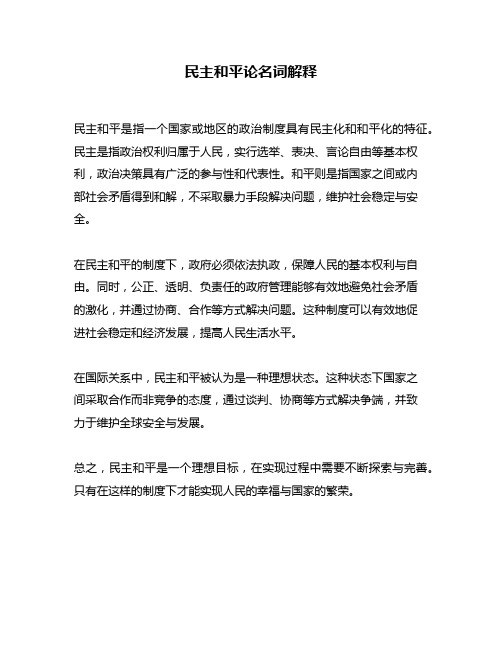
民主和平论名词解释
民主和平是指一个国家或地区的政治制度具有民主化和和平化的特征。
民主是指政治权利归属于人民,实行选举、表决、言论自由等基本权利,政治决策具有广泛的参与性和代表性。
和平则是指国家之间或内
部社会矛盾得到和解,不采取暴力手段解决问题,维护社会稳定与安全。
在民主和平的制度下,政府必须依法执政,保障人民的基本权利与自由。
同时,公正、透明、负责任的政府管理能够有效地避免社会矛盾
的激化,并通过协商、合作等方式解决问题。
这种制度可以有效地促
进社会稳定和经济发展,提高人民生活水平。
在国际关系中,民主和平被认为是一种理想状态。
这种状态下国家之
间采取合作而非竞争的态度,通过谈判、协商等方式解决争端,并致
力于维护全球安全与发展。
总之,民主和平是一个理想目标,在实现过程中需要不断探索与完善。
只有在这样的制度下才能实现人民的幸福与国家的繁荣。
亨廷顿的_第三波_与_民主和平_思潮

向民主化 ,这样的政权最多 ,有 16 个 ;二是 置换 ( replacement ) ,即威权政权垮台或被 推翻 , 这 样 的 政 权 有 6 个 ; 三 是 转 移 (t ransplacement) ,即执政集团与反对集团 达成妥协 ,采取联合行动走向民主化 ,这样 的政权有 11 个 。此外 ,他也提到了一个例 外模式 ,即象格林纳达和巴拿马那样由外 部势力干预而带来的民主化 。第四章继续 回答“民主化过程的特征如何”( how ?) 的 问题 。他提出了“妥协 、选举 、非暴力是第 三波民主化的共同特征”⑤ 的观点 。第五 章则 回 答 新 民 主 政 体“如 何 持 久”( how long ?) 的问题 。既然民主化浪潮有明显的 进两步退一步的规律性 ,第三波民主化已 出现了这个征兆 ,那么如何才能解决回潮 的问题呢 ? 他为此总结出了新民主政体可 能碰到和必须面对的 3 类问题 ,即 :转型问 题 (t ransition problems) 、情境问题 (contex2 t ual problems) 和体制问题 ( systemic prob2 lems) ,并且还花费大量笔墨探讨了前两类 问题在第三波民主化过程中的处理方式及 重要性 。第六章回答民主化“何去何从” (whit her ?) 的问题 ,展望了民主化的前景 , 提出了“时间属于民主一边”⑥ 的观点 。
民主和平论
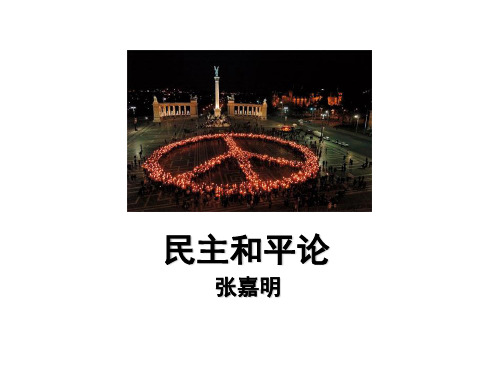
民主和平论的提出
• 米切尔· 多伊利: 《康德、自由主义 遗产和外交事务》 (1983)
民主和平论的提出
• 米切尔· 多伊利 (Michael W. Doyle, 1948— ) 现执教于哥伦比亚大学 国际与公共事务学院。 2011年获美国政治科学 协会(APSA)颁发的休伯 特· 汉弗莱奖。
Email: md2221@
• 媒体独立性
当前出版自由的状况——包括是否设立文字诽谤罪、是否袭扰记者、采编的 独立自主;私人出版在资金上的可行性;以及公民个人的互联网接入程度
地方分权;地方政府的职责、选举和能力;以及地方当局的透明度和责任性
• 地方民主治理
• 司法的完整性与独立性 • 腐败程度
宪制改革、人权保护、刑法改革、司法独立、少数民族地位、保障法律面前 人人平等、对待嫌犯和罪犯的态度,以及遵守司法裁决
–文化/标准模式 –结构/体制模式
如何衡量“民主”?
Freedom of World Freedom House
Nations in Transit
Criteria for Evaluation
• 国民主治理 • 选举流程 • 民间团体
民主特征与政府制度的稳定性;立法与执法机构的独立性、有效性和责任性; 以及对军事与安全的民主监督 国家行政选举与立委选举、选举流程、多党制发展,以及大众的政治参与度 非政府组织(NGOs)的发展、组织能力和财力可持续性;非政府组织所处 的法律和政治环境;自由贸易协会的发展;以及利益集团的政治参与度
Consolidated Authoritarian Regime
Authoritarianism
民主和平论与美国
• 美国的国际地位和试图在世界范围内建立 以美国基督教文化为主导的价值观 • 东欧剧变与苏联的解体,在一定意义上成 为美国实行民主外交的强心剂
民主和平论
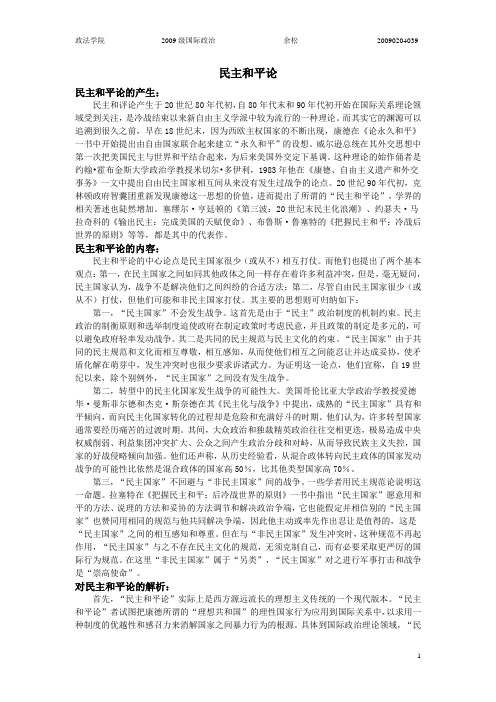
民主和平论民主和平论的产生:民主和评论产生于20世纪80年代初,自80年代末和90年代初开始在国际关系理论领域受到关注,是冷战结束以来新自由主义学派中较为流行的一种理论。
而其实它的渊源可以追溯到很久之前,早在18世纪末,因为西欧主权国家的不断出现,康德在《论永久和平》一书中开始提出由自由国家联合起来建立“永久和平”的设想。
威尔逊总统在其外交思想中第一次把美国民主与世界和平结合起来,为后来美国外交定下基调。
这种理论的始作俑者是约翰•霍布金斯大学政治学教授米切尔•多伊利,1983年他在《康德、自由主义遗产和外交事务》一文中提出自由民主国家相互间从来没有发生过战争的论点。
20世纪90年代初,克林顿政府智囊团重新发现康德这一思想的价值,进而提出了所谓的“民主和平论”,学界的相关著述也陡然增加。
塞缪尔·亨廷顿的《第三波:20世纪末民主化浪潮》、约瑟夫·马拉奇科的《输出民主:完成美国的天赋使命》、布鲁斯·鲁塞特的《把握民主和平:冷战后世界的原则》等等,都是其中的代表作。
民主和平论的内容:民主和平论的中心论点是民主国家很少(或从不)相互打仗。
而他们也提出了两个基本观点:第一,在民主国家之间如同其他政体之间一样存在着许多利益冲突,但是,毫无疑问,民主国家认为,战争不是解决他们之间纠纷的合适方法;第二,尽管自由民主国家很少(或从不)打仗,但他们可能和非民主国家打仗。
其主要的思想则可归纳如下:第一,“民主国家”不会发生战争。
这首先是由于“民主”政治制度的机制约束。
民主政治的制衡原则和选举制度迫使政府在制定政策时考虑民意,并且政策的制定是多元的,可以避免政府轻率发动战争。
其二是共同的民主规范与民主文化的约束。
“民主国家”由于共同的民主规范和文化而相互尊敬,相互感知,从而使他们相互之间能忍让并达成妥协,使矛盾化解在萌芽中,发生冲突时也很少要求诉诸武力。
为证明这一论点,他们宣称,自19世纪以来,除个别例外,“民主国家”之间没有发生战争。
从鳕鱼战争看_民主和平论_的疏漏

3何冠一,四川外国语大学英语系学生(重庆400031)。
从鳕鱼战争看“民主和平论”的疏漏何冠一摘 要 “民主和平论”在冷战后影响日益增大,特别是在一些西方民主国家,甚至成为政府制定对外政策的重要依据。
虽然该理论的基本论点即民主国家的性质决定民主国家之间不会或很少打仗,显得颇为雄辩和自得,但仍然存在着一些难以自圆其说的问题,如公认的民主国家的定义问题和民主国家对非民主国家好战的问题。
除了揭批其理论本身的瑕疵,本文拟从一个罕见的现代民主国家之间军事冲突的例子———英国和冰岛之间的“鳕鱼战争”出发,通过论述民主和平论在此冲突中的失效,着重说明:如果没有其他体系因素的调节,民主因素不足以阻止冲突的发生,民主国家之间同样存在走向军事冲突甚至战争的危险。
关键词 鳕鱼战争 民主和平论 民主国家 英国 冰岛20世纪90年代以来,“民主和平论”开始引起我国学者的广泛关注。
由于该理论本身存在一些难以自圆其说的问题,再加上奉行民主和平论的一些西方国家以此为依据,向外推行其价值观念,频频干涉他国内政,我国学者对其往往采取质疑和批判的态度。
然而,相关批驳文章多是从理论上向其提出质疑,很少有人提出反例来论证其不妥之处。
本文认为,可以将20世纪50年代到70年代发生在冰岛和英国之间的“鳕鱼战争”,作为一个现实的反例,以供我们进一步研究民主和平论在理论上的不当。
通过分析“鳕鱼战争”的前因后果,我们可以清楚地看到,民主因素在那场冲突中极度淡化,这证明了民主和平论的观点在此案例中表现出很大的疏漏。
一、民主和平论的流变民主和平论是自由主义的一个重要流派,其基本观点是民主国家之间不会或极少发生战争,因为民主制度能够使为战争承担主要代价的人民约束政府的对外行为。
民主和平论者一般把康德提出的相关理论认做民主和平论的最早渊源。
1795年,康德(I m manuel Kant)撰写了《永久和平》一文,他认为,在立宪共和制度下,对外宣战需得到公民的准许,而对此公民极为小心谨慎,因为战争的后果将由他们直接承担。
国际政治学第一次作业
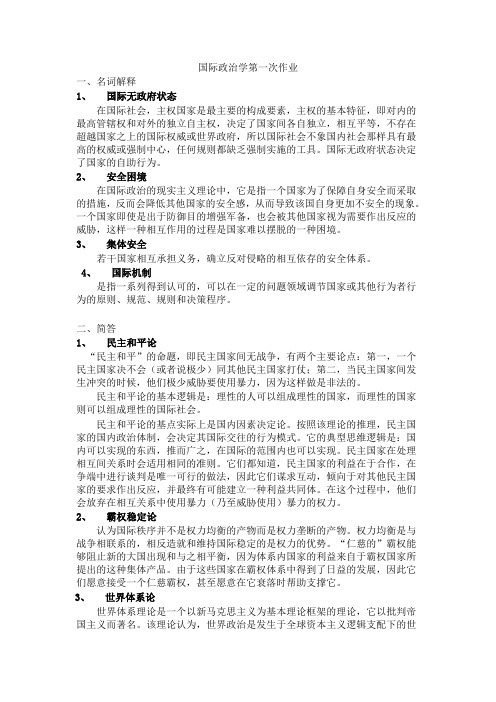
国际政治学第一次作业一、名词解释1、国际无政府状态在国际社会,主权国家是最主要的构成要素,主权的基本特征,即对内的最高管辖权和对外的独立自主权,决定了国家间各自独立,相互平等,不存在超越国家之上的国际权威或世界政府,所以国际社会不象国内社会那样具有最高的权威或强制中心,任何规则都缺乏强制实施的工具。
国际无政府状态决定了国家的自助行为。
2、安全困境在国际政治的现实主义理论中,它是指一个国家为了保障自身安全而采取的措施,反而会降低其他国家的安全感,从而导致该国自身更加不安全的现象。
一个国家即使是出于防御目的增强军备,也会被其他国家视为需要作出反应的威胁,这样一种相互作用的过程是国家难以摆脱的一种困境。
3、集体安全若干国家相互承担义务,确立反对侵略的相互依存的安全体系。
4、国际机制是指一系列得到认可的,可以在一定的问题领域调节国家或其他行为者行为的原则、规范、规则和决策程序。
二、简答1、民主和平论“民主和平”的命题,即民主国家间无战争,有两个主要论点:第一,一个民主国家决不会(或者说极少)同其他民主国家打仗;第二,当民主国家间发生冲突的时候,他们极少威胁要使用暴力,因为这样做是非法的。
民主和平论的基本逻辑是:理性的人可以组成理性的国家,而理性的国家则可以组成理性的国际社会。
民主和平论的基点实际上是国内因素决定论。
按照该理论的推理,民主国家的国内政治体制,会决定其国际交往的行为模式。
它的典型思维逻辑是:国内可以实现的东西,推而广之,在国际的范围内也可以实现。
民主国家在处理相互间关系时会适用相同的准则。
它们都知道,民主国家的利益在于合作,在争端中进行谈判是唯一可行的做法,因此它们谋求互动,倾向于对其他民主国家的要求作出反应,并最终有可能建立一种利益共同体。
在这个过程中,他们会放弃在相互关系中使用暴力(乃至威胁使用)暴力的权力。
2、霸权稳定论认为国际秩序并不是权力均衡的产物而是权力垄断的产物。
权力均衡是与战争相联系的,相反造就和维持国际稳定的是权力的优势。
民主和平论辩论稿

民主和平论辩论稿我方坚定认为民主国家之间不会发生战争!何为民主国家?民主国家应当具有以下特征:1.人民拥有超越立法者和政府的最高主权2.国家的成年公民均有选举权与被选举权,定期举行全体公民参与的自由和公正的选举,政府掌握在民选官员手里,选举结果基本上能反映民意诉求,政权通过民主选举顺利交接3.国家保障公民言论自由,宗教自由等基本人权,以多数决定、同时尊重个人与少数人的权利为原则,并应保证决策过程的公开性,新闻媒体对民选政府进行广泛的舆论监督4.依法治国,宪法体系下完善的法律,人人平等,社会贫富差距小,保护人们组织和充份参与社会政治、经济和文化生活的机会,司法独立5.社会文化充分发展,国家人民公民意识强,素质高,在整个社会和经济领域实现社会公正攻辩基本要点:一:体制的约束,民意的制约效应和国内政治结构中制衡原则可以阻止类似战争这样的劳民伤财政策的滥用。
在民主国家的政体下,决策的多元性与制衡性可以避免政府轻率地发动战争。
民主政体是和平政体,它以宪政法治为基础,把政治行为包括军事行为纳入法律的轨道,而且民主政体的精神和价值基础是平等、自由和博爱,而其中博爱原则是对暴力原则的直接否定。
二:民主规范和文化作为一种价值观念可以说明民主国家之间由于拥有共同的民主观念而相互尊敬和感知,从而使它们之间易于相互忍让并达成妥协,使矛盾化解在萌芽中。
三.从现实情况来看,纵观战后国际关系史,自19世纪以来,民主国家之间基本没有发生过战争。
相反,民主国家与专制国家,专制国家之间却经常发生战争,只要大力推进民主,世界的和平进程就能前进一大步。
四.通过所谓的国内民主选举上台的领导人发动国家间战争,这样的国家沦为战争的工具并非真正的民主国家。
独裁者可以不经过民选立法机构同意而按照他们自己的意愿而发动战争。
民主包含着多数人的统治和少数人的权利之间的严格标准,尊重法律而不是尊重权力的价值体系无论在国内还是在国际上都是实现秩序的最可靠保证!现代化和民主化是一个普遍的连续的文明进步过程,更是各民族国家自我认知和选择的过程,民主国家终将共同构筑和平世界!五.民主国家代表了人民的意愿,面对战争与和平,很明显,公民将直接承担战争的后果,人们自发选择和平避免政府作出战争的危险决策。
民主和平论(R.J. Rummel)
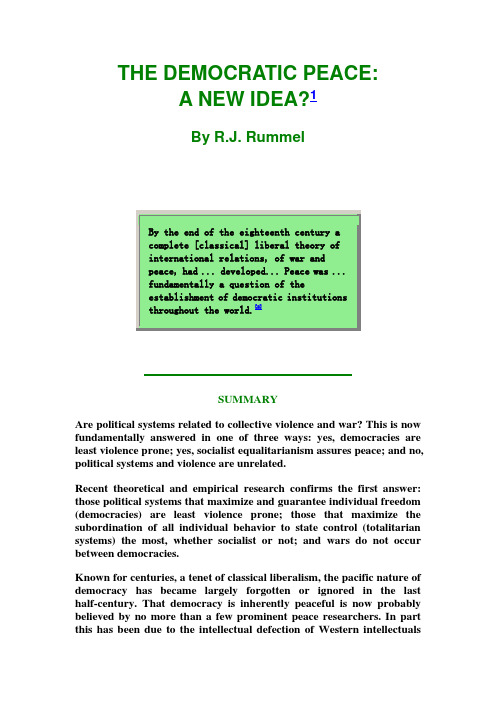
THE DEMOCRATIC PEACE:A NEW IDEA?1By R.J. RummelSUMMARYAre political systems related to collective violence and war? This is now fundamentally answered in one of three ways: yes, democracies are least violence prone; yes, socialist equalitarianism assures peace; and no, political systems and violence are unrelated.Recent theoretical and empirical research confirms the first answer: those political systems that maximize and guarantee individual freedom (democracies) are least violence prone; those that maximize the subordination of all individual behavior to state control (totalitarian systems) the most, whether socialist or not; and wars do not occur between democracies.Known for centuries, a tenet of classical liberalism, the pacific nature of democracy has became largely forgotten or ignored in the last half-century. That democracy is inherently peaceful is now probably believed by no more than a few prominent peace researchers. In part this has been due to the intellectual defection of Western intellectualsfrom classical liberalism to some variant of socialism, with its emphasis on the competitive violence and bellicosity of capitalist freedoms. Many intellectuals, and in particularly European and Third World peace researchers, have come to believe that socialist equalitarianism is the answer to violence; others, particularly American liberals, believe that if the socialist are wrong, then at least democracies are no better than other political systems in promoting peace.Socialism aside, there also has been a rejection of Western values, of which individual freedom is prominent, and acceptance of some form of value-relativism (thus, no political system is better than any other). In some cases this rejection has turned to outright hostility and particularly anti-Americanism, and thus opposition to American values, such as freedom. To accept, therefore, that democratic freedom is inherently most peaceful, is to the value-relativist, to say the unacceptable--that it is better. For another, to accept that this freedom promotes non-violence seems to take sides in what is perceived as the global ideological struggle or power game between the United States and Soviet Union.Independent of different ideological or philosophical perspectives, several interacting methodological errors have blinded intellectuals and peace researchers to the peacefulness of democracies. One of these is the strong, general tendency to see only national characteristics and overall behavior. Then a nation is rich or poor, powerful or weak, belligerent or pacific. But most important for identifying the relationship between freedom and violence is rather the similarities and differences between two states and their mutual behavior. Thus should be observed a lack of violence and war between democracies; and the most severe violence occurring between those nations with the least freedom.Another error has been to selectively focus upon the major powers, which include among them not only several democracies having many wars, but also Great Britain having the most. However, a systematic comparison among all the belligerents and neutrals in wars, would uncover the greater peacefulness of democracies.Along with this selective attention is the tendency to count equally against democracies all of its wars, no matter how mild or small. Thus, the American invasion of Grenada would be one mark against democracy; Hitler's invasion of Poland that initiated World War II would be a similar mark against non-democracies. This stacks any such accounting against democracy.Finally, while a systematic survey of the literature shows significant support for the inverse relationship between democracy and violence, researchers have done little theoretical testing of this relationship, thus resulting in their overlooking or ignoring it when it appears in their results.DEMOCRACIES PROMOTE NONVIOLENCEThe organizers of this conference asked me write a taxonomic paper on the question: "Can the relative bellicosity of states be measured and predicted as a function of their internal political system?" The answer of most current empirical research is decidedly yes.[3]Indeed, the empirical relationship is even more profound and comprehensive than the question implies. In theory and fact, the more democratic the political systems of two states, the less violence between them; and if they are both democratic violence is precluded altogether.[4] That is, democratic states do not make war on each other. Moreover, the more democratic a political system, the less foreign and domestic collective violence; the more totalitarian, the more likely such violence.[5]Perhaps the most surprising finding is that the less democratic a government, the more likely it will kill its own citizens in cold blood, independent of any foreign or domestic war. Now, war is not the most deadly form of violence. Indeed, while 36 million people have been killed in battle in all foreign and domestic wars in our century, at least 119 million more have been killed by government genocide, massacres, and other mass killing. And about 115 million of these were killed by totalitarian governments (as many as 95 million by communist ones). There is no case of democracies killing en masse their own citizens.[6] The inverse relationship between democracy and foreign violence, collective domestic violence, or government genocide is not simply a correlation, but a cause and effect. In a nutshell, democratic freedom promotes nonviolence. These results are worthy of the greatest attention and analysis, for if true, which I am now convinced they are, then peace research has in fact defined a policy for minimizing collective violence and eliminating war: enhance and foster[7] democratic institutions--civil liberties and political rights--here and abroad.[8]THE CLASSICAL LIBERALSThe fundamental inverse relationship between freedom and violence is truly a matter of insight and knowledge gained and lost among political philosophers to be rediscovered through rigorous theoretical and empirical research by peace researchers. In fact, so long ago as 1795, in his virtually now forgotten Perpetual Peace, Immanuel Kant systematically articulated the positive role of political freedom in eliminating war; and proposed therefore that constitutional republics be established to assure universal peace. This proposal has various nuances, such as those involving the difference between republics and democracies, and between political and economic freedom, but the essential idea was this: the more freedom people have to govern their own lives, the more government power is limited constitutionally, the more leaders are responsible through free elections to their people, then the more restrained the leaders will be in making war. In Kant's words:[9]The republican constitution...gives a favorable prospect for thedesired consequence, i.e., perpetual peace. The reason is this: if the consent of the citizens is required in order to decide thatwar should be declared (and in this constitution it cannot butbe the case), nothing is more natural than that they would be verycautious in commencing such a poor game, decreeing for themselves all the calamities of war. Among the latter would be: having tofight, having to pay the costs of wars from their own resources,having painfully to repair the devastation war leaves behind,and, to fill up the measure of evils, load themselves with a heavy national debt that would embitter peace itself and that can neverbe liquidated on account of constant wars in the future. But, onthe other hand, in a constitution which is not republican, andunder which the subjects are not citizens, a declaration of war is the easiest thing in the world to decide upon, because war doesnot require of the ruler, who is the proprietor and not a memberof the state, the least sacrifice of the pleasures of his table,the chase, his country houses, his court functions, and the like.He may, therefore, resolve on war as on a pleasure party for themost trivial reasons, and with perfect indifference leave thejustification which decency requires to the diplomatic corps whoare ever ready to provide it.Through the writings of Kant, de Montesquieu, Thomas Paine, Jeremy Bentham, and John Stuart Mill, among others, it became an article of classical liberal faith in the 18th and 19th centuries that "Government on the old system," as Paine wrote, "is an assumption of power, for the aggrandizement of itself; on the new [Republican form of government as just established in the United States], a delegation of power for the common benefit of society. The former supports itself by keeping up a system of war; the latter promotes a system of peace, as the true means of enriching a nation."[10]These liberals believed that there was a natural harmony of interests among nations, and that free trade would facilitate this harmony and promote peace. Most important, they were convinced that monarchical aristocracies had a vested interest in war. It was, in contemporary terms, a game they played with the lives of the common folk. Empower the common people to make such decisions through their representatives, and they would always oppose war.In an historical perspective that they did not have, it is clear that the classical liberals had too much faith in the masses. They did not anticipate the rise of nationalism, although the French Revolution and the Napoleonic Wars presaged what our century would behold in full glory: the total nation at arms, total mobilization and total war. They did not appreciate how the superheated hatred and revengefulness of majorities can drive democratic nations to war. The Crimean and Boar Wars, and the Mexican-American and Spanish-American wars were yet to occur. The clamor for war can be irresistible to ambitious politicians. But much to their peril, popular leaders also have discovered the flip side to Popular Will. The people can be aggressive today, pacific tomorrow. One need only contrast the popular support for American involvement in Vietnam from 1963 to 1966, to the vigorous hostility among intellectuals and opinion leaders to a continuation of the war in 1969. Of course it is also true that the people can be stubbornly opposed to what they perceive as bellicose policies, no matter what their merits may be. Thus, President Roosevelt felt constrained by isolationist public opinion from giving all out military aid to America's fraternal ally Great Britain in 1940-1941, the time when her survival from air and submarine attacks by Nazi Germany was very questionable, indeed. Yet, in deference to massive public opposition to American involvement, Roosevelt could only aid indirectly, discreetly, or illegally under the table, this last European bulwark against Nazi tyranny, aggression, and genocide.In the 18th century classical liberals had to write about the pacific nature of democracies in the abstract, by hypothesis. Of course, the bellicose history of Emperors, Kings and Queens, and aristocracies, was clear. History could not tell them, however, how free peoples would behave. This could only be derived from reason and was ultimately based on faith. No wonder, then, that their associated theory was simplistic. Leaving out the invisible hand, harmony of interests, and free trade baggage, war would disappear among democratic nations because popular majorities would refuse to pay in their blood and property for such wars.As mentioned, the historical record now shows that the people are not only willing, but sometimes will demand to go to war. The problem with the theory is that it provides only an incomplete and superficial explanation, and for that reason is only correct part of the time (e.g., explains why America did not declare war on Hitler in 1940, but not why America did so against Spain in 1898). A proper theory of democratic peacefulness must allow for both these aggressive and pacific sides of Popular Will. It must go beneath public opinion and popular majorities and deal with the social forces involved. These are in terms of social fields, cross-pressures, and polarization.WHY DEMOCRACIES ARE LESS VIOLENTThe civil liberties and political rights of a democratic system foster and maintain an exchange society. This is a social field, whose medium is composed of a people's meanings (as those given to the flag or a cross), values, and norms; its social forces are imbedded in this medium and flow one way or another, forming various equilibriums among what people want, can, and will try to get; and conflict or cooperation within this field, violence or peace, depend on the congruence between these equilibriums and the expectations people have about the outcome of their actions.Democratically free people are spontaneous, diverse, pluralistic. They have many, often opposing, interests pushing them one way or another. They belong to independent and overlapping occupational, religious, recreational, and political subgroups, each involving its own interests; and then they are moved by the separate and even antagonistic desires of different age, sex, ethnic, racial, and regional strata.Freedom thus creates a social field in which social forces point in many different directions, and in which individual interests, the engine ofsocial behavior, are often cross-pressured. Like the Catholic political conservative who cannot decide whether to vote for the Episcopalian, Republican conservative, or the Catholic welfare democrat, many within a free society must balance often contradictory wants. This means that those very strong interests that drive the individual in one direction to the exclusion of all else, even at the risk of violence, do not develop easily. And, if such interests do develop, they are usually shared by relatively few individuals. That is, the normal working of a democratically free society in all its diversity is to restrain the growth across the community of that consuming singleness of view and purpose that leads, if frustrated, to wide-scale social and political violence. Consider by contrast a centralized society with a totalitarian government. In the main, behavior is no longer spontaneous, but commanded; in its major, most significant outlines, what one is and does is determined at the center. The totalitarian model is familiar and need not be elaborated. Relevantly here, such a system turns a social field into an organization, with a task to achieve (such as equality, communism, social justice, development), a management-worker, communal-obey class division cutting across all society, and all the characteristics of an organization (coercive planning, plethora of rules, lines of authority from top to bottom) needed to direct each member's activities.The consequence is to polarize major interests. If the satisfaction of one's interests depends always on the same "them"; if "they" are responsible for one's job, housing, quality and cost of food, and even life and death, then almost all that is important depends on whether one is in the command or obey class. In effect, these are two poles to which interests become aligned. Thus, and most importantly for us here, since most vital interests depend on one center, it is easy to see that the interests related to this center--who commands and what is commanded--are matters of grave concern. In a democracy one can shrug his shoulders over losing: "win some, lose some, I'll do better next time." But in a highly centralized system, a loss on one issue may result in a loss on all, including even one's life.With so much at stake, therefore, violence comes easily, especially to the rulers who must use repression and terror against possible dissent or sources of opposition; the gun, prison, or concentration camp are the major tools of social policy. And, as happened in Poland, in such a polarized system, conflict and violence involving local interests soon engage the whole society. For the split between those who command and obey is a fault line: slippage in one place moves along the whole faultand causes a social quake--wide-scale conflict and, given the importance of the issues, quite possibly violence.What about foreign violence? By virtue of the same cross-pressures restricting violence within democracies, the unification of public interests needed to pursue foreign aggression is usually missing. Given the lack of general public support, and perhaps the outright opposition of certain social or interest groups, a democratic leader would pursue a costly foreign conflict at great risk to his political future, even if he could get the government's counter-balanced machinery to work in the same perilous direction. This he can do, especially when some external threat or attack unites public opinion (as in Great Britain's military response to Argentina's invasion of the Falkland Islands), but not with anything like the political freedom with which a dictator or small ruling group can make war. And among democracies, each with its own pluralism, cross-pressures, and politically constrained leaders; and each quite possibly having a variety of political and commercial ties and transactions that create their own pro-peace interest groups; the forces opposing violence overwhelm any tendencies toward severe conflict, violence, and war between them.A totalitarian ruler has no such natural constraints. True, there will be cross-pressures among the elite. There are calculations to be made about the cost in lost trade, aid, allies, and the like, not to mention in resources and manpower. But such cross-pressures are usually within a particular direction (Should we invade today or wait? Should we squeeze them into submission?) and among often hand-picked subordinates. Real, fundamental opposition is lacking, where as in a democracy even the basic constitutional laws governing the making of war are open to debate and political contest.In all this I am simplifying to essentials, as in universally describing a falling body by a simple equation that ignores wind, body shape, and air friction. And the heart of this pure explanation is the difference between a social field of cross-pressured interests and politically responsible leaders versus a tightly organized society of polarized interests and dictatorial rulers. I am describing pure types, recognizing that there are many gradations between.But this should suffice here. To promote democratic institutions promotes a deeper and more durable peace because it promotes a social field, cross-pressures, and political responsibility; it promotes pluralism, diversity, and groups that have a stake in peace.THE SOCIALIST CRITIQUE OF CLASSICAL LIBERALISMContemporary theory aside, the classical liberal's view of democracy's peacefulness was insightful. But by the middle of the 20th century, this insight became almost completely ignored or forgotten.How did we fall off the classical liberal path to peace and fail to find it again until recently? There are several reasons for this, some ideological, some methodological. First and foremost, the classical liberal view itself fell into disrepute among intellectuals and scholars. Essentially, classical liberals believed that the government that governs least governs best. Adam Smith's An Inquiry into the Nature and Causes of the Wealth of Nations was their economic bible. And in current terms, they preached democratic capitalism. But beginning in the 19th century capitalism came under increasing attack by socialists of all flavors. First, the socialist agreed with the classical liberal that the people had to be empowered, and that this would bring peace. But what the socialist saw when the liberal creed was enacted into law, especially in Britain, was that the bellicose aristocracies were replaced by equally bellicose capitalists. Democracies and their attendant free market appeared to foster exploitation, inequality, and poverty; to enable a very few to rule over the many. Most important here, capitalism was seen not just to promote, but to require colonialism and imperialism, and thereby war. But what was to be done? Here the socialist mainly divided essentially into the democratic socialists, state socialists, and Marxists. The democratic socialists argued that true democracy means that both the political and economic aspects of their lives must be under the people's control, and this is done through both a representative government and government ownership, control, and management of the economy. The capitalist would be thus replaced by elected representatives, who would oversee economic planners and managers, and above all be responsive to popular majorities. With the aristocratic and capitalist interests in war thus eliminated, with the peace oriented worker and peasant democratically empower, peace would be assured.The state socialists, however, would simply replace representative institutions with some form of socialist dictatorship. This would assure the best implementation and progress of socialist equalitarianism, without interference by the bourgeoisie and other self-serving interests. Moreover, the people cannot be trusted to know their own interests, for they are easily blinded by pro-capitalist propaganda and manipulation. Burma today is a good example of state socialism in practice.While agreeing on much of the socialist analysis of capitalism, the Marxist added to it a deterministic, dialectical theory of history, a class analysis of societies, an economic theory of capitalism, and the necessity of the impoverishment of the worker and the inevitability of a communist revolution. However, the Marxist disagreed with the socialist on the ends. Never far from the anarchist, the Marxists, especially the Marxist-Leninist of our century, looked at the socialist state that would come into being with the overthrow of capitalism as nothing more than an intermediary dictatorship of the proletariat through which the transition to the final stage of communism would be prepared. And stripped of its feudal or capitalist exploiters and thus its agents of war, communism would mean, not the natural harmony among nations as in the liberal creed, but among all people as each works according to his ability and receives according to his need. The state then would wither away, and the masses would then live in true, everlasting peace and freedom.It should be underlined that while the democratic or state socialist believes that socialist governments will be peaceloving and nonviolent, the Marxist-Leninist believes this true of only the final, communist stage of stateless anarchy. The socialist transition period may well involve war with capitalist states, but while this inter-state war is to be avoided if at all possible in this age of nuclear weapons, the world-wide struggle against capitalism must be pursued by all means short of inter-state war. This would involve not only the arts of deception, disinformation, subversion, and demoralization, against capitalist states, but also terrorism and domestic wars through "national liberation fronts". For the Marxist-Leninist, then, it is the communist system that is inherently peaceful, not the socialist intermediary state. This socialist stage means the purposeful, aggressive use of force and violence to pursue the final, global stage of communist peace and freedom.In any case, regardless of the brand of socialism from which the critique of capitalism ensued, the protracted 19th century socialist assault on capitalism had a profound effect on liberalism and especially the theory of war. Falling into disrepute, its program seen as utopian or special pleading for capitalists, pure classical liberalism mutated among Western intellectuals into a reform or welfare liberalism that is little differentiated today from the programs and views of the early socialists. And this modern liberalism, or liberalism as it is now called, has been heavily influenced by the socialist view of war; and this modern liberal view grew widely influential in scholarly research on international relations, and thus war and peace. It must be recognized that until the 1960s such research was largely the preserve of the social sciences, andthat an overwhelming number of social scientists were by the mid-20th century modern liberals or socialists in their outlook.In the early 1960s the development of peace research began to take off and is today a full discipline. In its early years it was very much an American phenomenon and also very liberal in its view of war. Where real factors, as apart from psychological ones, were focused upon, war was generally believed to be caused by the existence of have and have not, rich and poor nations; by poverty, unrestrained competition, and the maldistribution of resources; by exploiting multinational corporations, armament merchants, and the military industrial complex. But peace research soon became internationalized, and with this global growth the European socialist and neo-Marxist's view of capitalism and war soon dominated. The milder, American peace researcher's modern liberal view soon became passe, and in its place one began to read about Western (capitalist) imperialism and dominance; about world capitalist economic control, manipulation, and war making; and about the promotion of non-violence through material equality and a socialist world economy. Positive peace and social justice became central concepts in peace research, both meaning some kind of socialist equalitarianism.[11]But what happened to the idea that individual freedom promotes nonviolence?[12]With the protracted socialist attack on the classical liberal's fundamental belief in capitalism, coupled with the apparent excesses of capitalism, such as sweat shops, robber barons, monopolies, depressions, and political corruption, classical liberalism eventually lost the heart and minds of Western intellectuals. And with this defeat went its fundamental truth about democracy promoting peace. Interestingly, in the last decade there has been a conservative resurgence of classical liberalism. President Ronald Reagan and Prime Minister Margaret Thatcher exemplify this, and their often expressed views on the positive role of free institutions for peace are straight out of classical liberalism. This popular resurgence has yet to percolate up to those in the social sciences and peace research communities.This is not to say that most peace researchers generally view capitalist political-economic systems as the cause of war, as asserted by hard-line socialists. Many European and Third World peace researchers generally view capitalism as one cause among several, although some theoretical emphasis may be given to capitalism, as in Galtung's influential center-periphery theory which clearly lays the major blame for war on a capitalist type, competitive system.[13] Indeed, many peace researchers, and especially Americans, have moved to a middle position:both capitalism or socialism can be a source of peace or war, depending on the circumstances. In either case, neither is a general factor in war. Now, capitalism and democracy are not the same thing. Democratic socialist systems exist, as in Sweden and Denmark, as do authoritarian capitalist systems like Chile and Taiwan. Why then has the peace-making effects of democratic freedoms been tossed out with capitalism? As mentioned, these freedoms were part of an ideology emphasizing capitalism--as the ideology retreated, so did its belief in the positive role of freedom in peace. But there other factors at work here that are at least as important.METHODOLOGICAL BLINDERSOne of these factors causing scholars and peace researchers to reject democracy's peacefulness is a misreading of history. Kant and the classical liberals were writing in theory about freedom and war; they had virtually no historical evidence. But by the middle of the 20th century enough democracies had existed for over half-a-century for an historical judgment to be made. And that was believed to show that democracies not only do go to war, but they can be very aggressive. Americans alone could easily note their American-Indian Wars, Mexican-American and Spanish American wars, and of course the Civil war, the most violent war of any in the century between the Napoleonic wars and World War I. And even if one argues that the United States was dragged into both World Wars, there is the invasion of Grenada and the Vietnam War, which many peace researchers view as a case of American aggression. Then, of course, there is Great Britain, who between 1850 to 1941 fought 20 wars, more than any other state. France, also a democracy for most of this period, fought the next most at 18. The United States fought 7. These three nations alone fought 63 percent of all the wars during these 92 years.[14]Of course, Britain did not become a true democracy until 1884 with the extension of the franchise to agricultural workers, but she was afterwards still the aggressor in numerous European and colonial wars. The historical record of democracies thus appeared no better than that of other regimes; and the classical liberal belief in the peacefulness of democracies seemed nothing more than bad theory or misplaced faith.But all other types of regimes seemed equally bellicose. The supposed peacefulness of socialist systems was belied by the aggressiveness of its two major totalitarian variants, that of the Soviet Union and Nazi Germany[15]; and other types of regimes, whether authoritarian。
华尔兹视野下的“民主和平论”

(. 1华东师范大学国际关系与地区发展研究 院 上海
206 ; . 师 范学 院外 语 系 002 2上饶 江 西 上饶 340 ) 30 1
摘
要: 当前 西方国际关 系理论界较流行的“ 民主和平论 ” 实际上是 为西方 大国尤其是 美国干 涉他 国 内政 , 推行强权政 治
提供依据 。以肯尼斯 ・ 尔兹的基本理论框 架为分析 工具 , 国际关 系的历 史考 量与理论 阐说 结合起 来探讨 时下流行 的“ 华 把 民
主和 平论 ” 有重大的理论和 实践意 义。历 史已经而且将 继续证明“ 具 民主和 平论 ” 不但 不科 学, 而且行不通。
关键词 : 肯尼斯 ・ 尔兹 ; 华 结构 ; 单元 ; 民主和平论 中国分类号 :8 5 D 1 文献标识码 : A 文章 编号 :0 4 10 ~ ̄9 (o6 o —04 0 9 2o )2 04~ 3
起的, 或者说如果都是民主国家, 那么就无战争发生 , 如果发
在当前世界体系和结构中, 国际社会仍是由各民族国家
生战争, 则都是非民主国家而起。这不仅在理论上讲不通, 组成 的集合体 , 基本特 征也是 “ 而 其 无政 府状 态” 。虽然 存在像 欧盟等国际组织 , 但它们缺乏国家内部那种公认的权 且抛开“ 民主和平” 论者的例子, 仔细阅读一下近代 以来的国 联合国、
释 的范 围 。
一
、
华尔兹意义下的理论
由此程序 , 也可 以对 民主 和平论 进行一 次考察和 检 我们
验 。首先 , 该理论 的 中心 论点 是 民主国家 很少或从 不相互 打
民主和平论 作为 一种理 论 , 从其产 生起 就在 国际关 系理 仗。 该论列举大量例子并提出了两个基本观点: 一是民主国 论领域受 到关 注。然而它是否真可 以称 为一种理论 呢?按 肯 家之 间同样存在许 多利益 冲突 , 但毫 无疑 问 民主国家认 为战
民主和评论

“民主和平论”在美国盛行的原因分析摘要:“民主和平论”是一种古老的国际关系理论,冷战后在美国盛行起来,一方面在理论界有大批学者进行研究,至今已产生三轮热潮;另一方面这一理论也影响到美国的对外政策,甚至成为美国核心国家战略的理论支撑。
同时美国作为当今世界中的唯一超级大国,其自身的变化会对其他国家有着巨大影响,理论、政策和意识形态密切相关,这一理论得到世界各主要大国理论界和政界的关注。
关键词:民主和平论美国软实力西方的国际关系理论对国际战争与和平的问题探讨已久。
从一战结束至今,出现了以美国总统威尔逊为代表的理想主义学派和以追逐强权和国家利益为国际关系的基本事实的现实主义学派,其后又有科学行为主义学派和传统主义学派以及新现实主义、理性主义与反思主义等理论流派,并展开了四次大辩论。
而此时,从国内体制的层次上探讨战争问题的“民主和平论”悄然兴起。
“民主和平论”的中心论点是,民主国家之间很少打仗,而且民主国家更容易用非武力的方式解决它们之间的分歧和冲突。
该理论提出了两个基本论点:第一,在民主国家之间如同其他政体之间一样存在许多利益冲突,但是民主国家认为战争不是解决它们之间纠纷的合适方法;第二,尽管自由民主国家很少(或从不)相互打仗,但它们可能和非民主国家打仗。
一.“民主和平论”在美国产生的文化根源“民主和平论”最早的版本出现在18世界德国思想家伊曼努尔·康德的论文《论永久和平》中,其提出了“民主和评论”的概念,而他当时只是把宪法制共和国作为永久和平的一个条件。
“民主和平论”最早在美国出现是一战后美国总统威尔逊提出的改造世界的“十四点计划”之中,将其作为“建立世界和平的纲领”。
威尔逊的这些主张形成了威尔逊主义,这一流派是西方传统自由主义的新发展,对后来的美国国际政治理论影响深远。
“民主和平论”在冷战后突然在美国盛行起来,在美国有着其深厚的文化背景和民众基础。
利用“民主和平论”对外进行民主制度输出,并不仅仅是某些统治者的个人癖好,而是由其民族的思想、文化和社会制度决定的,有着深厚的民族信仰、民族理念和制度根源。
世界和平发展理念的中西对比分析——以“民主和平论”与“和谐世界”理念为例

制度 的作 用 而忽 略 了其 他 因 素 , 而 该理 论 是 不严 谨 的。 2 0 因 自 0 5年 下 半 年 来 , 国领 导人 不 断 提 出“ 谐 我 和
较可 以看 出, O世纪上 半叶 , 界发生 了两次 毁灭性 的世 2 世 界大战 ,而 在这个世 纪 的后 半叶 ,尽管冷 战持 续 了近 4 O 多年 , 但热 战性质 的战争 毕竟没 有 发生 , 是世 界文 明共 这 同努 力 的结果 。 现在提给世界人 民的重要课究方向: 研 国际格局与 国家安全建设 。
一
65 —
维普资讯
肇 柬理 工夫 学 学 毂 ( 社会科学版 )
No . 3 2oo6
粹理性 思辨 的产 物 。在 这方 面 , “民主和平 论 ” “ 与 和谐 世界 ” 在源 头上有重要 的区别 ,这决 定 了两个理念 在根
世界 ” 崭 新 理念 , 日益 得 到 关 注 和 好评 。 本 文 主 要 从 对这 两种 理 论 出发 , 中西 方 的和 平 发 展 理 念 做 的 并 对
出分 析 和 比较 。
[ 关键 词 ] 主 和 平 论 ; 和 谐 ; 和 平 理 念 ; 和 谐 世 界 民
[ 图分 类 号 ]8 1 中 I 0 )
维普资讯
政 治 与法 律
● 政治与法律
世 界和平 发展 理念 的中西对 比分析
以 “ 主 和 平 论 ”与 “ 谐 世 界 ”理 念 为 例 民 和
范明英 孙增超
203 ) 0 2 7
国外“民主和平论”研究:批评与回应

国外“民主和平论”研究:批评与回应作者:倪春纳来源:《天津行政学院学报》2013年第05期摘要:从学术角度看,作为西方民主话语霸权体系重要的理论基石的“民主和平论”,是当前政治学领域重要的研究主题之一,被誉为国际关系中最接近经验法则的发现。
在民主如何导致和平的生成逻辑中,结构性解释是其中较有影响力的一种。
它认为民主国家复杂的政治过程和力求保持政治权力的领导人所面临的诱因激励,对战争和冲突起到了内在的约束。
然而许多学者发现,结构性解释中存在一些缺陷,如替代变量比较粗糙;理论预设失真和与经验证据相抵牾等问题。
结构性解释论者据此对已有解释进行了修正和完善,但并没有令人信服地解决先前的质疑。
关键词:民主和平论;结构性解释;批评;回应中图分类号:D082文献标识码:A文章编号:1008-7168(2013)05-0017-05在当今西方国家炙手可热的民主话语霸权中,“民主和平论”(Democratic Peace)是其重要的理论基石。
美国克林顿总统曾在其国情咨文演说中,明确提出了民主国家相互之间不会发生战争的论断,并强调在根本上确保美国安全的最佳策略和建立持续的和平是支持在其他地区推进民主。
“民主国家之间从不或很少发生战争”的“铁律”似乎确为西方国家输出民主提供了难以驳斥的正当性。
然而,仅从学术研究的角度视之,“民主和平论”是当前政治学领域重要的研究主题之一,它被誉为国际关系中最接近经验法则的发现。
自20世纪70年代以降,国外学者对“民主和平论”进行了长期不懈的探索,在民主如何导致和平的诸多生成逻辑中,结构性解释是较有影响力的一种。
一、“民主和平论”的结构性解释“民主和平论”的结构性解释又称制度性解释,最初由一些研究国际冲突的学者提出。
早在1976年,梅尔文·斯莫尔和戴维德·辛格就根据对1815年~1865年间民主国家战争倾向的定量分析,对政治制度与介入战争的频率关联进行了研究[1]。
亨廷顿《第三波》中的民主思想
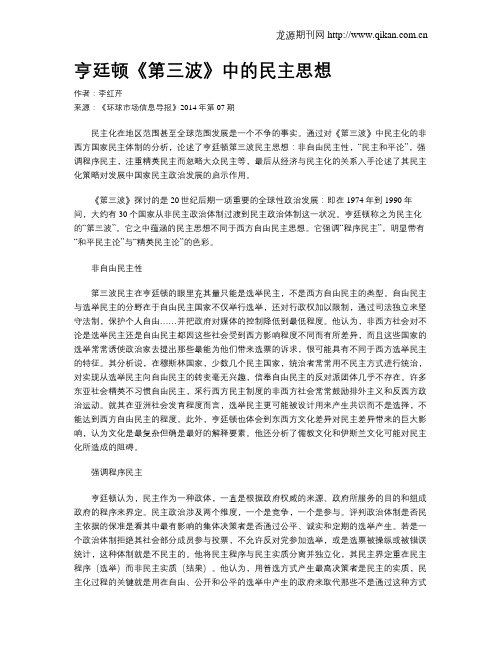
亨廷顿《第三波》中的民主思想作者:李红芹来源:《环球市场信息导报》2014年第07期民主化在地区范围甚至全球范围发展是一个不争的事实。
通过对《第三波》中民主化的非西方国家民主体制的分析,论述了亨廷顿第三波民主思想:非自由民主性,“民主和平论”,强调程序民主,注重精英民主而忽略大众民主等,最后从经济与民主化的关系入手论述了其民主化策略对发展中国家民主政治发展的启示作用。
《第三波》探讨的是20世纪后期一项重要的全球性政治发展:即在1974年到1990年间,大约有30个国家从非民主政治体制过渡到民主政治体制这一状况。
亨廷顿称之为民主化的“第三波”。
它之中蕴涵的民主思想不同于西方自由民主思想。
它强调“程序民主”,明显带有“和平民主论”与“精英民主论”的色彩。
非自由民主性第三波民主在亨廷顿的眼里充其量只能是选举民主,不是西方自由民主的类型。
自由民主与选举民主的分野在于自由民主国家不仅举行选举,还对行政权加以限制,通过司法独立来坚守法制,保护个人自由……并把政府对媒体的控制降低到最低程度。
他认为,非西方社会对不论是选举民主还是自由民主都因这些社会受到西方影响程度不同而有所差异,而且这些国家的选举常常诱使政治家去提出那些最能为他们带来选票的诉求,很可能具有不同于西方选举民主的特征。
其分析说,在穆斯林国家,少数几个民主国家,统治者常常用不民主方式进行统治,对实现从选举民主向自由民主的转变毫无兴趣,信奉自由民主的反对派团体几乎不存在。
许多东亚社会精英不习惯自由民主,采行西方民主制度的非西方社会常常鼓励排外主义和反西方政治运动。
就其在亚洲社会发育程度而言,选举民主更可能被设计用来产生共识而不是选择,不能达到西方自由民主的程度。
此外,亨廷顿也体会到东西方文化差异对民主差异带来的巨大影响,认为文化是最复杂但确是最好的解释要素。
他还分析了儒教文化和伊斯兰文化可能对民主化所造成的阻碍。
强调程序民主亨廷顿认为,民主作为一种政体,一直是根据政府权威的来源、政府所服务的目的和组成政府的程序来界定。
12.民主和平论

民主和平论的三次“浪潮”:
第一次:康德
第二次:一战后 第三次:冷战末期及战后(高潮)
2
理论渊源和发展过程-2/3
康德
在1795年写下的论文《论永久和平》中他将宪
法制共和国作为永久和平的必要条件之一。康 德的理论主张是,大多数人们永远不会在投票 中支持发起战争,除非是出于防卫。也因此, 如果所有的国家都是共和国,战争便永远不会 出现了,因为先行的侵犯永远都不会产生。
Index
民主和平论的理论渊源和发展过程 民主和平论的主要观点 民主和平论的基本理由
民主和平论的重要推论或补充
民主和平论的影响 Q&A 中国学术界对民主和平论的关注情况 对民主和平论的质疑与评价
对民主和平论的发散思考
1
理论渊源和发展过程-1/3
康德之前:
孟德斯鸠 威廉·古德温
8
B.来自民主制度、政治结构的约束
Institutional constraints Political structural explanations 与非民主制度相比,民主制度能够更多体
现对战争的抑制作用
a. 选举制度,经济和社会政策,非战争
b. 权力制衡,多元决策
9
推论与补充:
Bill Clinton
4
主要观点
民主国家不易卷入战争,它们的战争倾向性明显 比非民主国家弱得多;
民主国家几乎从来不相互发动战争,民主国家的 战争都是与非民主国家进行的;
民主国家的数目不断增加,战争的次数就会不断 减少,世界和平就越有希望。因而,全球的民主 化是世界和平的根本保障。
类似表述
5
基本理由——I 经验实证
民主和平论:两篇

评“民主和平论”“民主和平论”是时下西方国际关系研究领域风行的理论,它还是某些西方大国外交政策的理论依据之一,因而,这一理论引起国内学术界的广泛关注并不是偶然的。
“民主和平论”的主要观点是“民主国家之间不会发生战争”。
支持这一论点的论据有两个方面,一是从民主政治自身的性质出发,认为民主政治是和平政治,它以宪政法治为基础,把政治行为包括军事行为纳入法律的轨道;而且民主政治的精神和价值基础是平等、自由和博爱,而其中博爱的原则是对暴力原则的直接否定。
因此民主政治是能够避免战争与冲突的法宝。
第二方面的论证来自于历史上的经验事实。
民主和平论者认为,自19世纪初以来,除极个别的例外,民主国家之间没有发生过战争。
由此可以得出结论,尽管民主国家有可能与非民主国家之间发生战争,但民主国家之间无战争。
〔1〕这一理论出现以后颇具影响。
使之产生影响的原因除理论本身之外,还与冷战结束这一国际大背景直接相关。
在许多西方人尤其是统治阶级眼里,苏联解体与东欧剧变是自由民主制度和自由市场经济的决定性胜利。
正如福山在他1992年出版的《历史的终结和最后的人》一书中所说,“过去的几年里,在全世界出现了对自由民主制度作为一种政府制度的合法性的了不起的共识,它战胜了像世袭的君主制、法西斯主义,最近还有共产主义这样敌对的意识形态”。
〔2〕既然自由民主制度是一种“不能再作完善了”的制度,民主国家之间又不会发生战争,那么在全球范围内推广实现自由民主制度,将意味着世界永久和平的到来。
正因为如此,这一理论非常具有吸引力,也符合西方统治阶级的根本利益,因此“民主和平论”就成了某些国家推行外交政策的重要理论依据。
克林顿政府的“扩展战略”正是建立在民主国家之间无战争以及市场经济会自动转化成民主制度这两个基本设想之上的。
《欧洲》杂志社去年专门组织了一次专题讨论会,并于1995 年第4期刊登了一些比较有代表性的发言,以此推动学术界对此问题进行深入的探讨。
本文试图从历史的角度入手,展示西方民主政体在形成和发展过程中暴力的作用和冲突的迭起,以及随着西方民主政治的成熟及经济相互依赖程度的加深,暴力与冲突的变化与转移。
【推荐下载】谈谈民主和平论

[键入文字]
谈谈民主和平论
民主和平论,这一理论的兴起与发展引起了国内外学术界的广泛关注。
自第二次世界大战以来,世界上出现了相当长时间的没有战争的和平局面,尤其在一些大国之间,都在竭力发展本国的经济和科技。
国际政治学家们提出诸多理论来解释这一现象。
比如两级和平论、核和平论、相互依赖和平论等,其中引起我国国际关系学界关注度最高的要数和平民主论。
一、和平民主论的相关理论
(一) 和平民主论理论起源
民主和平论有着久远的历史。
早在1795年,康德在其著作《论永久和平》中就从道德法则和人权思想来说明国与国之间的关系,主张在主权独立、遵守道义和维护和平的原则上来实现国与国之间的和平。
后来的卢梭、威尔逊等人的有关论述,以及成熟于第一次世界大战后的理想主义更把民主和平论在理论与实践上推向了一个新的发展阶段,主张把自由、人权、民主等与国际安全、国际和平结合起来[1]。
1。
评“民主和平论”

作者: 李少军
作者机构: 中国社会科学院世界经济与政治研究所
出版物刊名: 欧洲研究
页码: 4-8页
主题词: 民主和平论;民主国家;民主政治;国际政治;大国外交战略;美国外交政策;战争;现实主义;民主制度;外交决策
摘要: 作者评价了近来在国外学术界引起很大争论的“民主和平论”。
所谓“民主和平”,实际上是一个命题,即民主国家间无战争。
赞同者以19世纪以来的统计资料为证据,论证了民主政治对国家战争行为的制约作用,认为民主国家会把解决国内问题的方法适用于处理与其他国家的关系、反对这一命题的人提出了种种理由,其中重要的一点是认为这个理论无法解释民主国家为什么热衷于同非民主国家打仗。
“民主和平论”之所以引起争论,是因为它与现实国际政治和大国外交战略有密切关系。
如果大国在制订外交政策时假定民主国家是和平的,非民主国家是麻烦制造者,那就不可避免地会得出这样的结论,即只有把后者都改造成民主国家,前者才会有真正的安全。
冷战结束以来,这一理论确实在很大程度上成了一些国家特别是美国的对外政策的一个支柱。
作者认为,讨论这一理论,也许有助于我们思考和平模式问题,因为在一些西方国家之间,确实形成了某种耐人寻味的机制。
民主和平论可以为我们的进一步探讨提供基础。
【推荐下载】谈谈民主和平论

谈谈民主和平论民主和平论,这一理论的兴起与发展引起了国内外学术界的广泛关注。
自第二次世界大战以来,世界上出现了相当长时间的没有战争的和平局面,尤其在一些大国之间,都在竭力发展本国的经济和科技。
国际政治学家们提出诸多理论来解释这一现象。
比如两级和平论、核和平论、相互依赖和平论等,其中引起我国国际关系学界关注度最高的要数和平民主论。
一、和平民主论的相关理论 (一) 和平民主论理论起源 民主和平论有着久远的历史。
早在1795年,康德在其著作《论永久和平》中就从道德法则和人权思想来说明国与国之间的关系,主张在主权独立、遵守道义和维护和平的原则上来实现国与国之间的和平。
后来的卢梭、威尔逊等人的有关论述,以及成熟于第一次世界大战后的理想主义更把民主和平论在理论与实践上推向了一个新的发展阶段,主张把自由、人权、民主等与国际安全、国际和平结合起来[1]。
二战的爆发使民主和平论的市场大大收缩。
1976年,梅尔文斯莫尔与戴维辛格在《民主政制的战争倾向:1816 1865年》中,正式提出民主国家无(很少)战争这一论断。
1983年,迈克尔多伊利在《康德,自由主义遗产与外交事务》一文中,在全面总结前人成果的基础上,比较系统地从自由主义角度论证了民主与和平的关系,把民主和平论这一经验性假说提高到理论判断层面[1]。
冷战结束后,在对二战后欧洲乃至世界范围内出现的长期和平现象的探讨中,民主和平论在自由主义泛滥的大潮中再次成为显学。
以1993年美国学者布鲁斯鲁塞特的《把握民主和平:冷战后世界的原则》的出现为契机,民主和平论在西方世界又引起了热烈的讨论。
1994年,克林顿正式把民主国家之间从未打过仗写进了他的国情咨文中。
克林顿政府用参与与扩展战略来取代冷战时美国长期奉行的遏制战略,就是建立在民主国家之间不打仗与市场经济可以推动民主化这两个基点之上的[2]。
冷战后由西方国家所发动的人权、民主等和平攻势,干涉主义的抬头和强权政治的强化,都或多或少受到民主和平论的影响。
- 1、下载文档前请自行甄别文档内容的完整性,平台不提供额外的编辑、内容补充、找答案等附加服务。
- 2、"仅部分预览"的文档,不可在线预览部分如存在完整性等问题,可反馈申请退款(可完整预览的文档不适用该条件!)。
- 3、如文档侵犯您的权益,请联系客服反馈,我们会尽快为您处理(人工客服工作时间:9:00-18:30)。
民主和平论
民主和平论的产生:
民主和评论产生于20世纪80年代初,自80年代末和90年代初开始在国际关系理论领域受到关注,是冷战结束以来新自由主义学派中较为流行的一种理论。
而其实它的渊源可以追溯到很久之前,早在18世纪末,因为西欧主权国家的不断出现,康德在《论永久和平》一书中开始提出由自由国家联合起来建立“永久和平”的设想。
威尔逊总统在其外交思想中第一次把美国民主与世界和平结合起来,为后来美国外交定下基调。
这种理论的始作俑者是约翰•霍布金斯大学政治学教授米切尔•多伊利,1983年他在《康德、自由主义遗产和外交事务》一文中提出自由民主国家相互间从来没有发生过战争的论点。
20世纪90年代初,克林顿政府智囊团重新发现康德这一思想的价值,进而提出了所谓的“民主和平论”,学界的相关著述也陡然增加。
塞缪尔·亨廷顿的《第三波:20世纪末民主化浪潮》、约瑟夫·马拉奇科的《输出民主:完成美国的天赋使命》、布鲁斯·鲁塞特的《把握民主和平:冷战后世界的原则》等等,都是其中的代表作。
民主和平论的内容:
民主和平论的中心论点是民主国家很少(或从不)相互打仗。
而他们也提出了两个基本观点:第一,在民主国家之间如同其他政体之间一样存在着许多利益冲突,但是,毫无疑问,民主国家认为,战争不是解决他们之间纠纷的合适方法;第二,尽管自由民主国家很少(或从不)打仗,但他们可能和非民主国家打仗。
其主要的思想则可归纳如下:第一,“民主国家”不会发生战争。
这首先是由于“民主”政治制度的机制约束。
民主政治的制衡原则和选举制度迫使政府在制定政策时考虑民意,并且政策的制定是多元的,可以避免政府轻率发动战争。
其二是共同的民主规范与民主文化的约束。
“民主国家”由于共同的民主规范和文化而相互尊敬,相互感知,从而使他们相互之间能忍让并达成妥协,使矛盾化解在萌芽中,发生冲突时也很少要求诉诸武力。
为证明这一论点,他们宣称,自19世纪以来,除个别例外,“民主国家”之间没有发生战争。
第二,转型中的民主化国家发生战争的可能性大。
美国哥伦比亚大学政治学教授爱德华·曼斯菲尔德和杰克·斯奈德在其《民主化与战争》中提出,成熟的“民主国家”具有和平倾向,而向民主化国家转化的过程却是危险和充满好斗的时期。
他们认为,许多转型国家通常要经历痛苦的过渡时期。
其间,大众政治和独裁精英政治往往交相更迭,极易造成中央权威削弱、利益集团冲突扩大、公众之间产生政治分歧和对峙,从而导致民族主义失控,国家的好战侵略倾向加强。
他们还声称,从历史经验看,从混合政体转向民主政体的国家发动战争的可能性比依然是混合政体的国家高50%,比其他类型国家高70%。
第三,“民主国家”不回避与“非民主国家”间的战争。
一些学者用民主规范论说明这一命题。
拉塞特在《把握民主和平:后冷战世界的原则》一书中指出“民主国家”愿意用和平的方法、说理的方法和妥协的方法调节和解决政治争端,它也能假定并相信别的“民主国家”也赞同用相同的规范与他共同解决争端,因此他主动或率先作出忍让是值得的,这是“民主国家”之间的相互感知和尊重。
但在与“非民主国家”发生冲突时,这种规范不再起作用,“民主国家”与之不存在民主文化的规范,无须克制自己,而有必要采取更严厉的国际行为规范。
在这里“非民主国家”属于“另类”,“民主国家”对之进行军事打击和战争是“崇高使命”。
对民主和平论的解析:
首先,“民主和平论”实际上是西方源远流长的理想主义传统的一个现代版本。
“民主和平论”者试图把康德所谓的“理想共和国”的理性国家行为应用到国际关系中,以求用一种制度的优越性和感召力来消解国家之间暴力行为的根源。
具体到国际政治理论领域,“民
主和平论”试图以制度范式来取代现实主义的强权和利益范式,在国际关系中的基本主体单位方面则设想由相同制度的国家共同体取代现实主义的民族国家,借以从根本上取代迄今仍居于统治地位的现实主义的国际政治理论。
“民主和平论”的思维方式从本质上来说仍是“西方对非西方”,在这一点上,它同冷战后纷起的其他理论,如“霸权稳定论”、“文明冲突论”等如出一辙。
这深刻地反映了冷战后西方尤其是美国想通过身份认同重构世界格局的愿望,并与西方扩张之初的“白人的责任”有异曲同工之妙。
其次,“民主和平论”首先在美国兴起,原因是多方面的。
主要是由于在目前对西方和美国相对有利的世界形势下,美国自身实力的衰退使它对维护自己的全球领导地位感到力不心,没有欧日等盟国支持,其领导地位无法稳固。
同时,冷战的结束使西方失去了主要的共同威胁,随着共同敌人的消失,以美国为首的西方国家集团的凝聚力大大下降,而制度认同是将以前的盟国重新凝聚起来的有效工具,因为在欧日等国认同的民主国家集团里,美国是当然的领袖。
尽管“民主和平论”存在着种种缺陷,但它提出的问题是耐人寻味的。
它为我们认识冷战后美国对外政策的走势和世界蓝图的设计提供了恰当的视角。
虽然冷战后美国对外战略并非一成不变,但从布什政府到克林顿政府,追求“民主和平”却是一脉相承的。
然而,作为一种政治制度,民主从来都是从内部“成长”出来并逐步成熟的,而不能由外部强加。
事实证明,输出一种制度在世界历史上鲜见成功的先例。
对民主和平论的评价:
“民主和平论”是美国对外战略的重要理论支柱,并成为新干涉主义政策的依据,这正是“民主和平论”备受西方政治家青睐的原因之一。
但无论是从理论还是从实践来看“民主和平论”都难以立足。
首先,“民主国家”导致和平的推理逻辑是错误的。
当今世界依然是民族国家的时代,总体而言,战争与和平的决定性因素依然是各自的国家利益。
维护国际和平的因素中,国际体系及所在的环境、国家地缘政治及战略利益、经济依赖及技术革命等都是不可忽视的变量;所谓“民意”、制衡原则以及“民主规范”并不是保持国际和平的充分必要条件。
其次,历史上所谓“民主国家”之间曾不止一次发生过战争,论者所说的“个别例外”绝非无关紧要的事件,而恰恰反映了战争的本质。
无论现在或将来,当所谓“民主国家”之间出现难以调和的重大利益冲突时,战争的发生依然不可避免。
历史的经验告诉我们,长期和平并非像国内政治通过既定的法律框架便能实现,而是通过妥协、竞争甚至战争重建均势而取得。
从政策层面看,“民主和平论”企图以各国意识形态和政治体制的差异,来掩盖各国追求国家利益最大化这一共同点,实际是在为西方的干涉主义寻求理论支持。
根据“民主和平论”的逻辑,既然“非民主国家”(即与西方政治制度不同的国家)和“转型中的民主国家”(如俄罗斯、东欧国家)是战争的罪魁,则“民主国家”(如美国)遏制、干涉乃至颠覆这些国家的行为就是维护和平的“崇高使命”。
“民主和平论”的政策目的也正在于此。
正如西方学者莱恩在《民主和平的神话》一书中所言:“民主和平论是危险的,它建立在愿望的基础上,反映了美国的干涉主义的外交政策,这个政策不会带来和平,而是更多的战争。
”。
